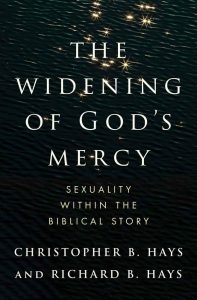It’s not every day a Christian leader has courage to change his mind on a theological position that risks reputation and social acceptance. But that is what New Testament scholar Richard Hays has done in a new book, written with his son Christopher Hays. Slated for release Sept. 10, The Widening of God’s Mercy: Sexuality Within the Biblical Story, created a stir months ago in anticipation of its arrival.
Richard became an evangelical darling in the 1990s with his defense of the traditionalist view on same-sex relationships. In his book The Moral Vision of the New Testament, he provided a hermeneutical framework for ethics, including a chapter on homosexuality that has been distributed widely for decades. But now he is apologizing for that chapter and the way it has been used against LGBTQ people. He writes, “I bear responsibility for the pain … caused to many believers who belong to sexual minorities. And for that I am deeply sorry.”

Karen Keen
Old Testament professor Christopher Hays also is taking risks by co-authoring the book. His employer, Fuller Theological Seminary, has not tolerated LGBTQ affirming faculty in the past. The evangelical school fired New Testament professor J. R. Daniel Kirk in 2015. More recently, a senior director was fired in 2020 and multiple students have been expelled over same-sex relationships, resulting in lawsuits.
When the courts gave Fuller a victory in 2021, Christoper says a “celebratory e-mail sent to the faculty … turned my stomach and spurred me along toward writing this book.” Recently, Fuller began evaluating school policy to possibly allow differing viewpoints. But it’s not clear if the initiative will succeed.
“Whether or not every reader is persuaded to affirm same-sex relationships, I’m hopeful all will be reminded of how great and merciful is our God.”
So, do Richard Hays and Christopher Hays make a compelling case for the full inclusion of LGBTQ people into the life of the Church? When Richard contacted me last year to ask if I would provide feedback on the manuscript (along with several others), my first reaction was, “What an amazing God we serve!” That’s still my response. The book addresses far more than sexuality; the bulk of it comprises a beautiful canonical portrayal of what God is like. Whether or not every reader is persuaded to affirm same-sex relationships, I’m hopeful all will be reminded of how great and merciful is our God.
The book is really about the gospel. In fact, they hope The Widening of God’s Mercy will speak not merely to those who are nonaffirming, but also people who are already affirming but may feel disillusioned with Christianity because of opposition to LGBTQ people.
What are Christopher and Richard affirming?
What exactly is the new position Christopher and Richard take? They “believe that sexual minorities who seek to follow Jesus should be welcomed gladly in the church and offered full access to the means of grace available to all God’s people: baptism, the Lord’s Supper, ordination, and the blessing of covenanted union.”
And how do they arrive at this conclusion?
Their argument does not rest on the six to eight verses prohibiting same-sex relations (although Richard spends time explaining the book of Romans). They agree these texts oppose same-sex relations. But Christopher and Richard consider proof-texting inadequate for sound biblical interpretation. Not only because historical context matters for discerning what exactly the biblical authors condemned (such as, perhaps, same-sex prostitution), but especially because the biblical narrative itself challenges such a rudimentary approach to moral judgments.
“Their argument does not rest on the six to eight verses prohibiting same-sex relations.”
The hermeneutical approach they take has various aspects but it’s canonical, looks to narrative patterns and centers God’s character as the primary interpretive lens. More specifically, they study God’s mercy from the Old Testament through the New Testament. Richard states:
(Jesus) challenges the Pharisees to rethink their restrictive scruples in light of the broader meaning of Hosea 6:6: “But if you had known what this means, ‘I desire mercy and not sacrifice,’ you would not have condemned the guiltless (Matt 12:7). Jesus is suggesting that mercy is the overriding message of scripture; Hosea 6:6 becomes the key that unlocks what Israel’s scripture is actually all about.
In trying to decipher the word “mercy” in the book’s title (pre-release date), conservative skeptics wonder if the book argues “anything goes,” while progressive skeptics wonder if it patronizes LGBTQ people as pitied sinners. Such anxiety suggests we could all use a refresher on what the gospel means by “mercy.” And this book does that.
To be clear, the book provides more than one nuance for the word “mercy.” It means mercy toward those unjustly oppressed, yet it also means mercy for sinners. But Christopher and Richard are not singling out LGBTQ people as recipients of mercy. Their book is about how all of us benefit from God’s kindness. In what follows, I draw out their primary arguments in more detail.
The reason for being

Richard B. Hays and Chris Hays
Christopher begins with the Genesis creation story. Why are we here? What is the reason we exist? Certainly, God made humankind to steward the earth and reproduce, but that doesn’t fully explain. Christopher draws on Jonathan Edwards’ proposal: It is characteristic of God’s nature to spread (“diffuse”) God’s fullness, and God’s goodness cannot be hindered. Thus, the title of the book refers to the expansion of God’s grace and love such that it includes “things other than himself.”
But as Christopher points out, Edwards proceeds to ignore his own thesis to focus on God’s love of himself. Instead of a God whose love widens to include others in relationship (our reason for being), Edwards’ self-focused god values human beings because they (ideally) direct more love to God. The result of such thinking is “Sinners in the Hands of an Angry God” — angry because the humans are failing to love God. If that sounds like narcissism, I agree.
Thankfully, that’s not the God of the Bible, and Christopher and Richard provide a more scriptural understanding of God’s character. In Genesis, we find a God who creates for relationship and delights in us and all of creation, declaring we are “good,” even “very good.” As Christopher states, “There might have been nothing, but instead there was something — more life, more to love — and (God) reacts to it with extraordinary joy.”
“Whether you think LGBTQ people are innocent or sinful, the answer is still the same: mercy.”
From this basis — the reason for our being — the book builds its understanding of mercy. Mercy is God’s “passionate, steadfast love.” Such merciful love is poured out in any number of situations, whether in cases of unjust oppression or willful sin. In all situations, we cannot outrun God’s mercy. Whether you think LGBTQ people are innocent or sinful, the answer is still the same: mercy. As God said, after being tested and tried by Israel, “How can I give you up Ephraim?” In other words, God just can’t quit us.
God changes his mind (and ours)
If you are like me, you were raised with a theology that says God does not change his mind. This idea is drawn from a few prooftexts and meant to reassure us of God’s dependability. But, it’s not an accurate reflection of the biblical record. Scripture frequently describes God changing his mind, and often it’s to relent from judgment.
 The book covers several examples. God expresses regret for creating humankind because of their wickedness and so will eliminate them from the earth (Genesis 6:6-7). But then God changes his mind and allows human beings to live, even though “the inclination of the human heart is evil from youth” (8:21). Ultimately, God would rather have us as we are, flaws included, than not have us at all.
The book covers several examples. God expresses regret for creating humankind because of their wickedness and so will eliminate them from the earth (Genesis 6:6-7). But then God changes his mind and allows human beings to live, even though “the inclination of the human heart is evil from youth” (8:21). Ultimately, God would rather have us as we are, flaws included, than not have us at all.
Similarly, God gets fed up with the Israelites and says he will wipe them out, but Moses persuades God to change his mind (Numbers 14:12, 15-19; also Exodus 32). On the surface, that implies Moses is more patient than God. But as Christopher points out, Moses quotes God’s own words of grace to make his case for pardon (Exodus 34:5-7; Numbers 14:15-19). In other words, these stories actually reflect the biblical authors’ increasing awareness of who God really is: a Creator who is “slow to anger, and abounding in steadfast love” (Exodus 34:6).
Christopher also provides examples from the prophets, which similarly address judgment. As Amos says, “The Lord has changed his mind, and said ‘It shall not be’” (7:3). Jeremiah says God changes his mind (18:7-10), and Jonah is actually upset that God changes his mind to show mercy (3:10; 4:2). Christopher writes of the prophets, “They sense that for God, judgment is not meant to be the last word.”
Of course, someone might object because God seems inclined to change his mind after human beings repent. Yet in Genesis, that’s not why God decided to let the human race continue after the flood despite our evil inclinations. And the main argument that God changes his mind is still demonstrated, even if repentance plays a role. Another key point Christopher makes is such change can arise because an advocate like Moses makes an appeal for pardon on behalf of a group. Similarly, nonaffirming Christians should stand in the gap for LGBTQ people rather than condemn them.
In the New Testament discussion, Richard demonstrates how the Holy Spirit changed minds in the early church. Examples include allowance for Gentiles to join the church, eunuchs as equal participants in worship, the conversion of Saul/Paul, ability to eat “unclean” food, and the waiving of circumcision and other commandments. Richard applies Romans 12:2 — “be transformed by the renewing of your mind” — to the practice of changing our minds under the Spirit’s guidance. Naturally, this involves Spirit-guided reinterpretation of Scripture.
Laws in the Bible are revisable
Dovetailing with God changing his mind is the reality that biblical laws change. The biblical authors revised mandates, even though they viewed them as from God. That’s a key point I also make in my 2018 book Scripture, Ethics, and the Possibility of Same-Sex Relationships. But while I connect such revision to ongoing spiritual discernment and our knowing only “in-part” (1 Corinthians 13:9-12), The Widening of God’s Mercy tends to connect it with God changing his mind or God’s openness to our appeals. Yet, Christopher also says, “sometimes … we find that we were wrong about the things we once believed God wanted.”
Examples of Old Testament legal changes that Christopher discusses include: Inheritance is to be given to daughters when previously only sons could inherit (Numbers 27:1-11), sacrifices are to occur in a single location when they were once allowable anywhere (Exodus 20:24; Deuteronomy 12:13-14), the sacrifice of a firstborn son is expected in one law and forbidden as a horror in another (Exodus 22:29b-30; Deuteronomy 18:10; also compare Ezekiel 20:25-26 and Jeremiah 7:31-32), and there are changes in slave laws (Exodus 21:1-11; Leviticus 25-44-46). Christopher suggests legal revision and/or legal discrepancies demonstrate God is open to human beings asking questions and challenging the status quo when there is warrant to do so — namely, when a law causes harm.
“We can discern when a law’s application ceases to meet God’s intent, namely, human well-being.”
Richard agrees, noting that obeying biblical laws can sometimes be contrary to the “spirit and intent” underlying them. He cites the Pharisees’ insistence on sabbath compliance in the face of suffering, thereby failing to “reflect on the purpose of the Sabbath law.” Richard sees his former self in these Pharisees as one who had been “uncomfortably aware of aching human need (among sexual minorities) but constrained by my interpretation of Scripture from responding with grace or generosity.”
Richard cites the religious leaders’ stubbornness in refusing to change their minds even as Jesus challenged them to do so. He says, “That is why Jesus is both angry and ‘grieved at their hardness of heart.’ I now suspect that the Lord may have been also grieved with me.” This hermeneutical lens of mercy over sacrifice (per Hosea 6:6) is not a license to sin, but rather refocuses our eyes on the underlying intent of a law. In doing so, we can discern when a law’s application ceases to meet God’s intent, namely, human well-being.
God is reconciling all things
God’s mercy extends to all, including the outsider. (This also provides an implicit subthread against Christian nationalism throughout the book.) God tells the Israelites, “the whole earth is mine” (Exodus 19:5-6) and calls Abraham and his descendants for the purpose of advancing the bigger mission of blessing all peoples (Genesis 12:3).
As Christopher notes, the Israelites themselves were a mixed ethnic group. Abraham was Mesopotamian, Moses married a Cushite, a mixture of people joined the exodus from Egypt, Boaz married a Moabite, David had high officials in his government who were Hittite, Ammonite and Gittite, the prophets say Egypt and Assyria will join the eschatological feast, and they even claim Persian king Cyrus as a messiah appointed by God. Not only is the foreigner welcomed, but other prophetic promises give hope for outsiders, such as the eunuch (Isaiah 56:4-5).
Regarding the New Testament, Richard notes Jesus preached God’s inclusivity of Sidon and Syria (Luke 4:25-27) and Paul speaks of strangers becoming recipients of God’s promises (Ephesians 2:12). But it’s not only ethnic others who are brought in, but also the “poor, the blind and oppressed,” which is part of a great “reversal,” where the first is last and the last first. For Richard, this concern for the outsider is God’s expansive mercy and should apply to the conversation on sexual minorities.
“God’s character is the lens for interpreting Scripture.”
So, is this simply the familiar “inclusion of the Gentiles” argument? Yes and no. The weakness of the Gentile inclusion approach is that ethnicity (or social class) is not a behavior. But what I hear Richard saying is the fact that mercy is extended to Gentiles tells us something about God’s merciful character and how God responds to people and situations.
And so, God’s character is the lens for interpreting Scripture.
Second, he also notes that Gentiles are not only included (they always had been as proselytes), but rather God has reconfigured the community into something new, such that grace and not Torah requirements now define the faith life for both Jew and Gentile.
Third, evidence of the Holy Spirit’s activity is a biblically endorsed means of discernment, per Acts’ account of the Gentiles. When experience presents us with evidence, it should prompt us to read Scripture “backward” to see what insights we overlooked the first time.
Conclusions
There’s much more to the book, including a thread emphasizing unity across differences. But this analysis is long enough, and I’ve summed up the main of it. Christopher and Richard are not advocating licentiousness nor pity. They’ve provided a thoroughly biblical overview of God’s merciful love that has compassion on our suffering.
Concerning injustice, the biblical authors recognized that applying laws without regard for suffering misses the whole point of the law. Concerning sin, the biblical authors increasingly understood that mercy always outruns judgment.
The last word from God on LGBTQ people is the same as for Ephraim, “How can I give you up?”
God simply won’t give up anyone. As Richard says, “In the end — in some unfathomable way — God will show mercy to all.” If we are imitators of God, we will do the same.
Karen R. Keen is a biblical scholar and spiritual care provider with The Redwood Center for Spiritual Care and Education. Her newest book is The Word of a Humble God: The Origins, Inspiration, and Interpretation of Scripture. She lives in Dallas.
Related articles:
Learning humility together as we read the Bible | Opinion by Karen Keen
The healing ‘heresy’ of Richard Hays | Opinion by Brandan Robertson
An oft-quoted biblical scholar changes his mind on LGBTQ inclusion in the church | Opinion by Anna Sieges


